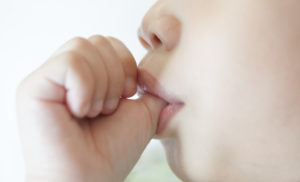
Many children suck their thumbs as a self-soothing behavior. It typically starts when babies have an innate sucking reflex, at which point it is relatively harmless. However, when thumb sucking continues beyond infancy, it can become a problematic habit with potentially significant consequences for your child’s oral development. Read on to learn more about the results of thumb sucking.
Are There Consequences of Thumb Sucking?
Early thumb sucking has few consequences, short of extra exposure to germs once your baby starts crawling. Many babies stop sucking their thumbs on their own once their sucking reflex has gone away. However, extended thumb sucking can begin to cause problems with the way your child’s teeth and mouth develop. The damage to teeth from thumb sucking also depends on how vigorously your child sucks their thumb, as more active thumb sucking impacts the teeth, jaw, and palate more.
If your child just passively holds their thumb in their mouth, it’s unlikely to cause the damage to teeth from thumb sucking that you often see. However, if your child’s habit is is more active or vigorous, there can be a number of consequences to thumb sucking, including:
- Baby teeth that move around and become misaligned
- Bite issues developing from misalignment
- Changes in the shape of the jaw
- Changes in the shape of the roof of the mouth
- Exposure to germs and viruses on the thumb
- Problems with the skin and nail on the thumb
- Sensitivity on the roof of the mouth
- Speech and communication problems
- Social impacts, including teasing
Most of these thumb sucking effects become more profound as children get older. While there are unlikely to be many negative effects of a one-year-old sucking their thumb, a five-year-old who sucks their thumb could experience significant issues as a result. The vigorousness with which your child sucks their thumb, combined with the length of time that they continue to do so, will ultimately be the deciding factor in how severe the consequences of thumb sucking are for your child.
Why Damage to Teeth From Thumb Sucking is Problematic
The results of thumb sucking on your child’s oral health can be lasting. Problems like damage to teeth, abnormal jaw development and roof of the mouth, and issues with a child’s bite are significant enough in and of themselves. However, these oral health problems can also be the cause of additional problems later as well.
Children who suck their thumbs for prolonged periods not only experience dental problems, but they may also struggle with:
- Speech impediments
- Pain and additional decay from misaligned bites
- Infections in the skin on their thumb
- Ridicule from their peers for continued thumb sucking
Additionally, because prolonged thumb sucking causes misalignment in the teeth and the bite, along with possible changes in the way the jaw and palate develop, orthodontic treatment is often needed the longer thumb-sucking continues. So how do you resolve thumb sucking effects?
Combatting the Results of Thumb Sucking
The best way to combat negative thumb sucking effects is to discourage it whenever possible. In young babies, you may be able to replace the habit by giving your baby a lovey to snuggle instead. In older children, it can be a little trickier.
One of the more helpful strategies is to identify your child’s thumb-sucking triggers. If it’s self-soothing for anxiety or when they’re tired, try to teach them other strategies to self-soothe. Ideally, you should choose a strategy that involves using their hands so that they can’t suck their thumb:
- Talk to your child about why it’s healthy to stop sucking their thumb.
- Find ways to provide positive reinforcement when they work on stopping the behavior.
- Don’t attach any attention, whether positive or negative, to the thumb sucking itself. This can actually exacerbate the problem.
- Give calm reminders and praise your child when you notice they avoid sucking their thumb.
If the above methods don’t work, ask your child’s dentist for help. They can talk to your child about why it’s important for their dental health that they stop sucking their thumb, and they may even recommend thumb shields or an orthodontic device to help your child stop thumb sucking.
How Prolonged Thumb Sucking Effects Impact Overall Health
While most children stop sucking their thumbs on their own, some children become especially attached and may struggle to stop the habit. If it continues past age two, the damage to teeth from thumb sucking can become a significant problem. After age four or five, the results of thumb sucking will likely require orthodontic interventions.
Moreover, older children who suck their thumbs often have visible impacts to their oral development and may also have speech impediments or insecurities that can cause shame or embarrassment as a result. In order to prevent these problems, it is best to avoid using negative reinforcement, such as punishment or shaming, to stop your child from thumb sucking. As noted in the previous section, if your child needs help stopping the behavior, your child’s dentist could offer essential support.
For more information about how thumb sucking effects could end up impacting other aspects of your child’s health, reserve your copy of If Your Mouth Could Talk, by Dr. Kami Hoss, a dental expert, dentist, and dad. You can discover how every part of your child’s health is connected and why taking care of their oral health is essential to their overall health, too.
Sources:
https://www.uofmhealth.org/health-library/hw170183
https://www.mouthhealthy.org/en/az-topics/t/thumbsucking
https://www.mayoclinic.org/healthy-lifestyle/childrens-health/in-depth/thumb-sucking/art-20047038
https://www.healthline.com/health/parenting/thumb-sucking-teeth#takeaway
https://www.sharecare.com/health/childrens-oral-health/does-sucking-thumb-ruin-teeth
https://www.childrensdent.com/fun-stuff/our-blog/why-is-thumb-sucking-harmful

